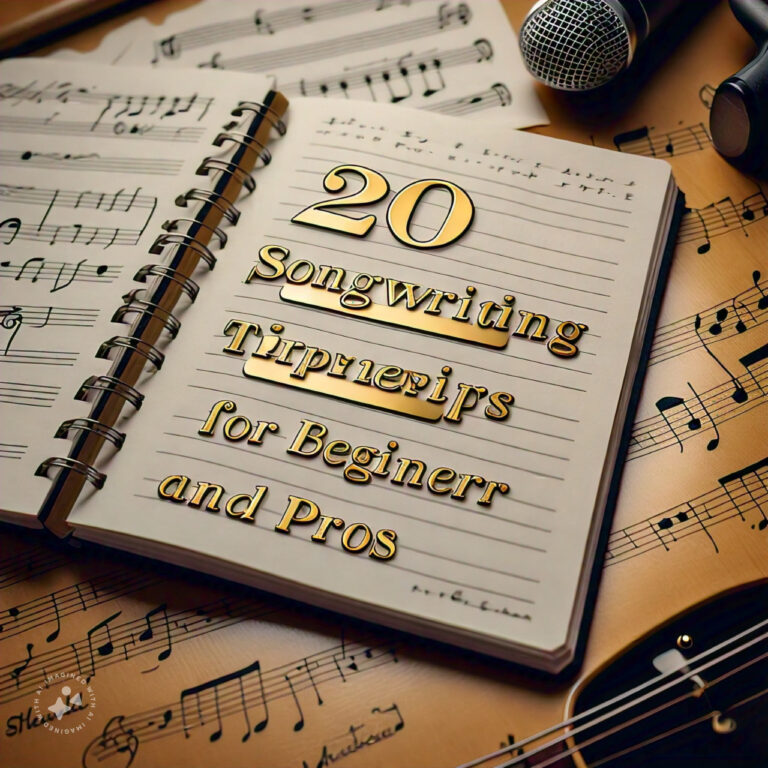Here in this blog post, we are going to give you 20 Songwriting Tips for Beginners and Pros, this guides is for both beginners or pros, just make sure you read this post to the end.
Have you ever felt the chills listening to a song that seemed to reach right into your soul? That’s the magic of songwriting, a craft that blends emotion, storytelling, and musical know-how. Whether you’re just starting or a seasoned pro, songwriting is a lifelong journey of expression and discovery. In this guide, I’ll share 20 tips that have shaped my own musical path, from finding inspiration to crafting unforgettable melodies and lyrics.
Facts About Songwriting
Songs have an incredible ability to move us, to make us laugh, cry, and dance. They capture moments in time, tell stories, and express feelings that words alone can’t always convey. As a songwriter, you have the power to touch hearts, change minds, and leave a lasting impact on the world. And trust me, there’s no greater feeling than seeing someone connect with a song you’ve created.
Every songwriter starts somewhere. Some are born with a natural gift for melody, while others hone their craft through years of practice and dedication. But regardless of where you are on your songwriting journey, there’s always something new to learn, a different approach to try, or a fresh perspective to gain.
Who This Guide is For?

This guide is for anyone with a passion for songwriting, from beginners who are just starting to explore their musical potential to seasoned pros looking for new ways to spark creativity. Whether you’re dreaming of topping the charts or simply want to write songs for your own enjoyment, the tips and techniques shared here will help you unlock your inner hitmaker.
Let’s dive in!
Tips 1: Finding Inspiration and Ideas
Inspiration can strike anywhere, anytime. It might be a conversation overheard in a coffee shop, a breathtaking sunset, or a personal experience that stirs your emotions. As a songwriter, it’s important to be open to these moments of inspiration and to cultivate a habit of capturing them. Keep a notebook handy, use a voice recorder on your phone, or jot down ideas in a songwriting app. You never know when your next great song idea will come along.
Pro Tip: I always keep a notebook by my bed. Some of my best melodies have come to me in the hazy moments between sleep and wakefulness.
Tip 2: Freewriting and Brainstorming
Sometimes, the best way to find inspiration is to simply start writing. Don’t worry about grammar, structure, or rhyme schemes. Just let your thoughts flow freely onto the page. You might start with a single word, a phrase, or an image that sparks your interest. As you write, you’ll likely discover new ideas, connections, and possibilities.
Brainstorming Tip: Try setting a timer for 10-15 minutes and write down as many song ideas as you can. Don’t edit yourself; the goal is to generate a list of possibilities that you can later refine.
Tip 3: Explore Musical Prompts
If you’re feeling stuck, try using a musical prompt to kickstart your creativity. This could be a chord progression, a rhythm pattern, or even a song title. Start playing around with the prompt, improvising melodies or lyrics, and see where it leads you. You might be surprised at the unexpected turns your song takes.
Personal Example: One of my most popular songs started with a simple four-chord progression that I found on YouTube.
Tip 4: Consume Diversely
Listening to a wide variety of music can open your ears to new sounds, styles, and techniques. Don’t limit yourself to your favorite genres. Explore different cultures, eras, and musical traditions. You might discover unexpected sources of inspiration that you can incorporate into your own songwriting.
Pro Tip: Create playlists of songs that you admire, and analyze their structure, melodies, and lyrics. This can help you understand what makes a great song work and inspire you to try new things.
Tip 5: Melody Matters
A strong melody is the heart of a great song. It’s what people hum along to, what gets stuck in their heads, and what makes them want to listen again and again. Focus on crafting melodies that are memorable, catchy, and evoke emotion. Don’t be afraid to experiment with different rhythms, intervals, and melodic contours.
Beginner Tip: If you’re new to songwriting, try humming or singing your melodies before you write them down. This can help you capture the natural flow and feel of the music.
Tip 6: Lyrics That Stick
Lyrics are the storytellers of your song. They can paint vivid pictures, evoke emotions, and convey powerful messages. Choose words that are meaningful, evocative, and resonate with your audience. Consider using rhyme schemes, imagery, and figurative language to add depth and richness to your lyrics.
Personal Example: I often draw inspiration for my lyrics from personal experiences, observations, and conversations.
Tip 7: Structure and Form
Song structure provides a framework for your music, guiding the listener through the different sections of the song. Most popular songs follow a verse-chorus-bridge structure, but there are many other variations you can explore. Understanding song structure can help you create songs that are well-paced, dynamic, and satisfying to listen to.
Beginner Tip: Listen to your favorite songs and map out their structure. This can help you understand how different sections work together to create a cohesive whole.
Tip 8: Hooks That Hook
A hook is a musical or lyrical phrase that grabs the listener’s attention and keeps them engaged. It could be a catchy melody, a repeated lyric, or a combination of both. Hooks are often found in the chorus of a song, but they can appear anywhere. Crafting strong hooks is essential for creating songs that stick in people’s minds.
Pro Tip: Try writing multiple hooks for your song and see which one resonates the most. You can also experiment with different placements of your hook within the song structure.
Tip 9: Chord Progressions and Harmony
Chord progressions are the foundation of your song’s harmonic structure. They create mood, tension, and resolution, and they can significantly impact the overall feel of your music. Experiment with different chord progressions to find ones that complement your melodies and lyrics.
Pro Tip: Learn about different types of chords (major, minor, diminished, augmented) and how they can be used to create different moods and emotions.
Tip 10: The Art of the Bridge
A bridge is a section of a song that contrasts with the verse and chorus, providing a musical and lyrical detour. Bridges can add surprise, create tension, or offer a new perspective on the song’s theme. When used effectively, a bridge can elevate your song to a new level of sophistication and intrigue.
Personal Example: In one of my songs, I used a bridge to introduce a new character and shift the narrative perspective.
Tip 11: Production and Arrangement
Production and arrangement involve the selection and placement of instruments, sounds, and effects to create a full and polished song. While you don’t need to be a professional producer to write great songs, having a basic understanding of production techniques can help you make informed decisions about how to present your music.
Beginner Tip: Experiment with different instruments and sounds to see how they complement your melodies and lyrics. You can use free or low-cost music software to create simple demos of your songs.
Tip 12: Songwriting for Specific Genres
Different genres of music have their own conventions and expectations. When writing for a specific genre, it’s important to understand its typical song structures, lyrical themes, and musical styles. This will help you tailor your songwriting to appeal to fans of that genre.
Pro Tip: Listen to a wide variety of songs within your chosen genre to get a sense of its characteristic elements. You can also study the work of successful songwriters in that genre to learn from their techniques.
Tip 13: Seek Feedback
Getting feedback from other musicians or trusted listeners can be invaluable for improving your songwriting. Ask for constructive criticism on your melodies, lyrics, and song structure. Be open to suggestions and willing to make changes. Remember, feedback is not a personal attack, but a valuable tool for growth.
Personal Example: I regularly share my songs with a small group of fellow songwriters and musicians. Their feedback has helped me identify weaknesses in my songs and make them stronger.
Tip 14: Learn from the Masters
Analyzing hit songs can teach you a lot about songwriting. Study the structure, melodies, lyrics, and production of songs that you admire. Pay attention to how the different elements work together to create a memorable and impactful song.
Beginner Tip: Create a playlist of your favorite songs and take notes on what makes them special. You can also find online resources that offer detailed analyses of popular songs.
Tip 15: Collaborate and Co-write
Collaborating with other songwriters can be a rewarding and enriching experience. It can expose you to new ideas, techniques, and perspectives, and it can help you push your creative boundaries. When co-writing, it’s important to establish clear goals and communication channels, and to be respectful of each other’s contributions.
Pro Tip: Look for co-writers who have different strengths and weaknesses than you. This can lead to a more balanced and dynamic songwriting partnership.
Tip 16: Embracing the Revision Process
Rarely is a song perfect on the first draft. Revision is where the magic truly happens. Don’t be afraid to cut verses, rewrite choruses, or experiment with different arrangements. Sometimes, a song needs time to breathe and evolve before it reaches its full potential.
Pro Tip: Take a break from your song for a few days or weeks and come back to it with fresh ears. You might be surprised at the new ideas and perspectives you discover.
Tip 17: Record and Demo Your Songs
Recording your songs, even if it’s just a simple demo, is a crucial step in the songwriting process. It allows you to hear your music objectively, identify areas for improvement, and share your work with others. You don’t need a fancy studio to get started – a smartphone, a laptop, and some basic recording software can do the trick.
Beginner Tip: There are many free and affordable resources available online for learning how to record and produce your own music. Don’t be afraid to experiment and have fun with it!
Tip 18: Set Goals and Stay Consistent
Songwriting, like any creative pursuit, requires dedication and discipline. Set realistic goals for yourself, whether it’s writing a certain number of songs per week or completing a demo by a specific deadline. Create a songwriting routine and stick to it as much as possible, even when you’re not feeling inspired.
Personal Example: I try to write for at least an hour every day, even if it’s just jotting down ideas or playing around with melodies. This helps me stay connected to my creative flow and keeps the ideas flowing.
Tip 19: Overcome Writer’s Block
Everyone experiences writer’s block at some point. The key is to not let it discourage you. Try changing your environment, experimenting with different songwriting techniques, or taking a break from music altogether. Sometimes, the best way to overcome writer’s block is to simply step away and allow your mind to rest and recharge.
Pro Tip: Keep a list of songwriting prompts or exercises that you can turn to when you’re feeling stuck. You can also try collaborating with other songwriters to get a fresh perspective.
Tip 20: Believe in Yourself
The most important tip I can offer is to believe in yourself and your songwriting abilities. It’s easy to get discouraged, especially when you’re first starting. But remember, songwriting is a journey, not a destination. Celebrate your small victories, learn from your mistakes, and keep pushing yourself to grow and improve.
Personal Anecdote: Early in my career, I received a lot of rejection from record labels and publishers. But I never gave up on my dream of writing and performing my own music. I kept writing, learning, and growing, and eventually, I found my audience and achieved success on my own terms.
Conclusion
Songwriting is a deeply personal and rewarding journey. It’s a way to express yourself, connect with others, and make a difference in the world. By applying the tips and techniques shared in this guide, you can unlock your creative potential, write songs that resonate with your audience, and ultimately, achieve your songwriting goals.
Remember, there’s no right or wrong way to write a song. The most important thing is to be true to yourself, your emotions, and your musical vision. Embrace the challenges, enjoy the process, and never stop learning and growing as a songwriter.
FAQs
How do I know if my song is good?
There’s no single answer to this question, as “good” is subjective. However, a good song typically has a strong melody, meaningful lyrics, a solid structure, and an emotional impact on the listener. Seek feedback from trusted friends or fellow musicians, and be open to constructive criticism.
How do I get my songs heard?
There are many ways to share your music with the world. You can post your songs on online platforms like SoundCloud or Bandcamp, perform at open mics or local venues, or submit your music to blogs and radio stations. Networking with other musicians and industry professionals can also open doors to new opportunities.
What are some common songwriting mistakes to avoid?
Some common mistakes include writing clichés, forcing rhymes, overcomplicating your music, and neglecting song structure. It’s also important to avoid copying other artists’ work and to develop your own unique voice and style.
How do I overcome writer’s block?
Try changing your environment, experimenting with different songwriting techniques, taking a break from music, or collaborating with other writers. Remember, writer’s block is temporary, and there are many ways to overcome it.
Is it necessary to learn music theory to be a good songwriter?
While music theory can be helpful, it’s not essential. Many successful songwriters have little or no formal music training. What’s more important is to have a good ear for melody, a passion for music, and a willingness to learn and experiment.
I hope this guide has been helpful and inspiring! Now go forth and write some amazing songs! The world is waiting to hear your music.


